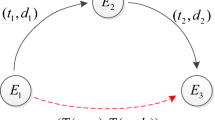Abstract
Social networks let the people find and know other people and benefit form their information. Semantic Web standard ontologies support social network sites for making use of other social networks information and hence help their expansion and unification, making them a huge social network. As social networks are public virtual social places much information may exist in them that may not be trustworthy to all. A mechanism in needed to rate coming news, reviews and opinions about a definite subject from users, according to each user preference. There should be a feature for users to specify how much they trust a friend and a mechanism to infer the trust from one user to another that is not directly a friend of the user so that a recommender site can benefit from these trust ratings for showing trustworthy information to each user from her or his point of view from not only her or his directly trusted friends but also the other indirectly trusted users. This work suggests using fuzzy linguistic terms to specify trust to other users and proposes an algorithm for inferring trust from a person to another person that may be not directly connected in the trust graph of a social network. The algorithm is implemented and compared to an algorithm that let the users to specify their trust with a number in a definite range. While according to the imprecise nature of the trust concept writing and reading a linguistic expression for trust is much more natural than a number for users, the results show that the algorithm offers more precise information than the previously used algorithm especially when contradictory beliefs should be composed and also when a more precise inference is potentially possible in searching deeper paths. As the trust graphs and inference are viewed abstractly, they can be well employed in other multi agent systems.
Access this chapter
Tax calculation will be finalised at checkout
Purchases are for personal use only
Preview
Unable to display preview. Download preview PDF.
Similar content being viewed by others
References
Golbeck J. (2005). Computing and Applying Trust in Web-based Social Networks. Doctor of Philosophy Dissertation, University of Maryland, College Park, 200 pages.
Golbeck J. (2005). Semantic Web Interaction through Trust Network Recommender Systems: End User Semantic Web Interaction Workshop at the 4th International Semantic Web Conference, November 2005.
Golbeck J., Hendler J., Inferring Trust Relationships in Web-based Social Networks. ACM Transactions on Internet Technology, 2005 (in press).
Golbeck J., Hendler J. (2004) Reputation network analysis for email filtering: Proceedings of the First Conference on Email and Anti-Spam, July 2004, Mountain View, California.
Golbeck J., Hendler J. (2004) Accuracy of Metrics for Inferring Trust and Reputation in Semantic Web-based Social Networks: Proceedings of EKAW 04.
Golbeck J., Parsia B., Hendler J. (2003) Trust Networks on the Semantic Web: Proceedings of Cooperative Intelligent Agents, 2003, Helsinki, Finland.
Ziegler C, Golbeck J. (2005) Investigating Correlations of Trust and Interest Similarity — Do Birds of a Feather Really Flock Together?: Submitted to the Journal of Artificial Intelligence Research.
Author information
Authors and Affiliations
Editor information
Editors and Affiliations
Rights and permissions
Copyright information
© 2006 Springer Science+Business Media, LLC
About this paper
Cite this paper
Lesani, M., Bagheri, S. (2006). Applying and Inferring Fuzzy Trust in Semantic Web Social Networks. In: Koné, M.T., Lemire, D. (eds) Canadian Semantic Web. Semantic Web and Beyond, vol 2. Springer, Boston, MA. https://doi.org/10.1007/978-0-387-34347-1_3
Download citation
DOI: https://doi.org/10.1007/978-0-387-34347-1_3
Publisher Name: Springer, Boston, MA
Print ISBN: 978-0-387-29815-3
Online ISBN: 978-0-387-34347-1
eBook Packages: Computer ScienceComputer Science (R0)




